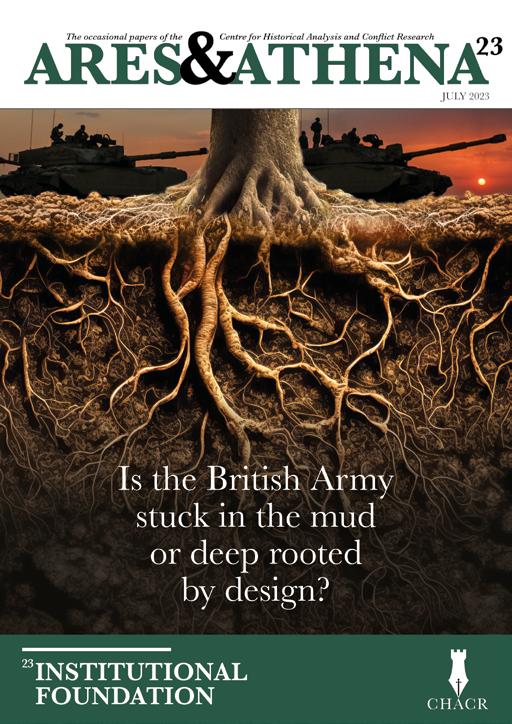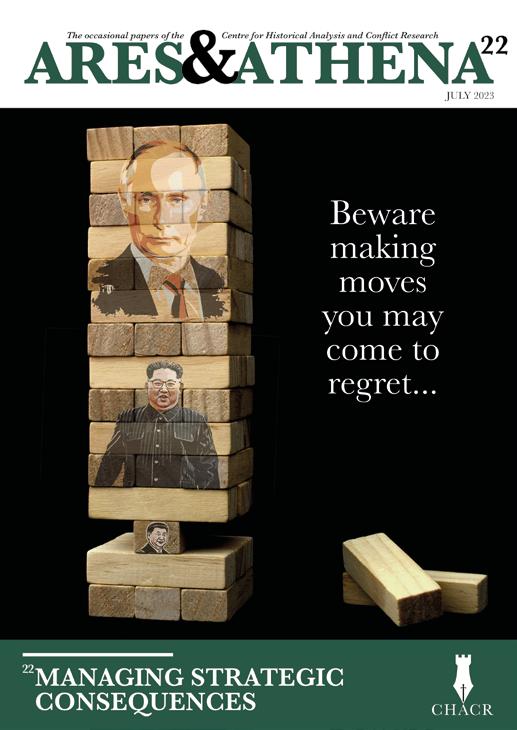CHACRDIGEST#23
EUROPE’S SKY SHIELD INITIATIVE


Responding to Russia’s invasion of Ukraine and the obviously increased threat that Moscow’s incumbent administration poses to European security, Germany and other European partners have launched the European Sky Shield Initiative – an effort to strengthen European air and missile defence structures and systems. Writing for the German Institute for International Security Affairs, Lydia Wachs provides a useful overview of the scheme, its rationale and objectives. Wachs also highlights the main weaknesses and challenges Sky Shield faces, including strategic incoherences, technical problems and, perhaps most importantly, the political differences plaguing its implementation.
WHAT DOES PRIGOZHIN’S DEATH MEAN FOR PUTIN AND THE WAGNER GROUP?
The demise of infamous Wagner boss Yevgeny Prigozhin has led to speculation about the future of Russia’s armed forces, the security of President Putin, and how Russia moves forward following a turbulent two months that featured an aborted coup attempt. This interview on Spectator TV is an excellent short analysis of what has taken place and considers who, if anybody, can step in to fill Prigozhin’s shoes. Alternatively, this piece by Reuters asks what Prigozhin’s death means for the Russian president in the long run given that Putin seems to have broken his word so brazenly regarding the late Wagner leader’s safety. Suspicious deaths are, of course, nothing new in Russia. Top military officials and oligarchs have been dying at an alarming rate since the war began. Here is a list of key personnel in the business sector who have died mysteriously and an analysis of the increase in deaths among senior military personnel since 2022.
RUSSIAN MILITARY PERSONNEL REFORMS SINCE 1991
The performance of the Russian military during its full-scale invasion of Ukraine has raised many questions about the success and effectiveness of reforms implemented to modernise the Russian armed forces since the collapse of the Soviet Union. A detailed new research paper published by RAND, featuring the work of numerous well-respected authors, provides a fascinating overview of how the Russian leadership has sought to overcome personnel and proficiency challenges in the three decades between 1991 and 2021.
DIGITALISATION OF DEFENCE


In 2022 and 2023, NATO adopted the Digital Transformation Vision and Digital Transformation Implementation Strategy, respectively, and the EU has committed to a Strategic Implementation Plan for the digitalisation of its forces. All things digital –from cyber security to artificial intelligence and the concept of the Internet of Things –have moved to the centre of debates about what the militaries and security services of the future need to be able to do in order to fulfil their missions. Simona Soare’s research paper for the International Institute of Strategic Studies provides a useful summary of both the digitalisation efforts going on in NATO and the EU, and the challenges that need to be overcome.
EUROPE’S MIGRATION SYSTEM IN CRISIS
In early June, a dilapidated fishing boat carrying an estimated 750 people who had set off from Libya in the hope of reaching Europe sank off the coast of Greece; only 100 or so of those on-board survived. The disaster was illustrative of the scale and devastating nature of the continuing – and long-standing – migration crisis in the Mediterranean. Over the past decade, hundreds of thousands of migrants and refugees, fleeing conflict or socio-economic hopelessness, have sought to cross the sea. All efforts to contain the crisis, including several military operations and often haphazard attempts to strengthen local security forces in North Africa, appear to have achieved little. In a report edited by Matteo Villa and Fabio D’Aguanno, the Italian Institute for International Political Studies argues for a reassessment of Europe’s external migration policies.
TOWARDS MORE EUROPE-INDIA COOPERATION
Countries across Europe have identified the Indian Ocean – and China’s expanding presence therein – as one of their main strategic priorities for the coming decades. In a report for the European Council on Foreign Relations, Frederic Grare and Manisha Reuter argue that Europe and India share significant interests in establishing and supporting regional maritime capacity building programmes in the Indian Ocean region. They see this as vital in strengthening island and coastal states that themselves do not possess the means to resist an ever more assertive China.
WHAT WOULD IT TAKE TO GET ISRAEL AND SAUDI ARABIA TO MAKE A DEAL?
It is no longer a secret that the US has been encouraging Saudi Arabia and Israel to reach an agreement on normalisation of relations. Although recent statements from US officials have tried to curb expectations, the security establishments of both nations have been quietly briefing about the parameters such a deal might take. In this analysis, former Pentagon official Andrew Exum looks at the conditions that might lead to a deal. He argues that, for the US, a good deal formalises relations between the two sides while allowing the US to focus less time and money on the Middle East. This means the deal needs to be based on lasting mutual understanding in which both sides reinforce economic ties, while making a serious attempt to work on joint security that does not require thousands of US troops to enforce.
AFGHANISTAN TWO YEARS LATER
Two years after the international withdrawal from Afghanistan in the summer of 2021, the country that the US, UK and many western countries had expended so much blood and treasure in over the preceding two decades is firmly back in Taliban hands. The West has largely turned its back. Writing for Chatham House, David Loyn argues that it is time to look again at Afghanistan and to look to bolster what remains of the country’s anti-Taliban opposition. Relatedly, the recording of a recent Chatham House event featuring speakers from the World Food Programme, the Afghan Red Crescent Society, and the Danish Refugee Council, all of which still try to work in Afghanistan, offers a highly informative snapshot of where things stand in the country.
NEWS STORIES TO WATCH OUT FOR

As the war in Ukraine and its multi-dimensional repercussions continue to dominate headlines, here are some other topics to keep an eye on:
In Canada, the military is being deployed to help combat record wild fires (mainly in British Columbia).
BRICS is looking to expand; with more than 40 countries keen to join, its members hope to establish the grouping as a bloc representing the Global South.
In late August, Zimbabwe faced an historic presidential election with the potential to turn away from the decadeslong legacy of its late dictator Robert Mugabe.
North Korea has conducted further missile tests as the US and South Korea are beginning annual training exercises.
In Pakistan, extremist groups have been attacking churches following supposed blasphemy allegations.
The Swedish government has raised the terrorism threat level following the public burning of copies of the Quran at protests across the country.
China is in the process of shaking up its nuclear weapons force in what is seen as another blow to one of President Xi’s key appointments.
Renewed clashes in Amhara raise fears that Ethiopia could slide back into civil war.
The Biden administration is making a play in the Pacific by hosting a trilateral summit with leaders of Japan and South Korea at Camp David.
WHAT NOW FOR THE COUNTRY THAT BET ITS SECURITY ON WAGNER?
In the wake of Yevgeny Prigozhin’s death, the BBC has raised questions over the potential repercussions for the Wagner Group on the African continent – shining a spotlight on a fractious Mali, which has offshoots of Al Qaeda and Islamic State roaming in its north. Wagner fighters have been supporting the Malian Army, but are less numerous or indeed disciplined than the French and UN soldiers they have been brought in to replace. There are also accusations that the Group turns a blind eye to the complexities of Mali in favour of trying to control natural resources, such as gold.
COUP IN NIGER
On 26th July, high-ranking Nigerien officers announced a coup against their country’s democraticallyelected President Mohamed Bazoum. In recent years, Niger had become an increasingly important Western partner in an ever-more unstable Sahel region. Under Bazoum, the country was a cooperative partner both in efforts to contain terrorist threats in the region, and to counter irregular migration and other illicit trafficking through Africa towards Europe. Niger also seemed to be a holdout in a region in which Russian influence – spearheaded by the Wagner Group – was growing. The coup puts all this in question. The International Crisis Group has put together a very useful Q&A primer on what happened in Niger in late July, what could happen next, and what the implications for regional and global security might be.
FUKUSHIMA, NUCLEAR SAFETY OR POLITICS BY OTHER MEANS?

Political tensions have risen between Japan and its neighbours in South Korea and China following the decision by Japanese energy company TEPCO to pump treated water from the stricken Fukushima nuclear plant into the ocean. The water contains carbon 14 and tritium but has been deemed safe by the scientific community. The releases have, however, driven a spate of panic buying in China and Korea and China has instigated temporary bans on all sea produce from Japanese waters. In this summary, the BBC discusses whether this is a case of facts against fear, or whether an issue of nuclear safety has become another dispute to add to the list of grievances held by the region’s powers.



